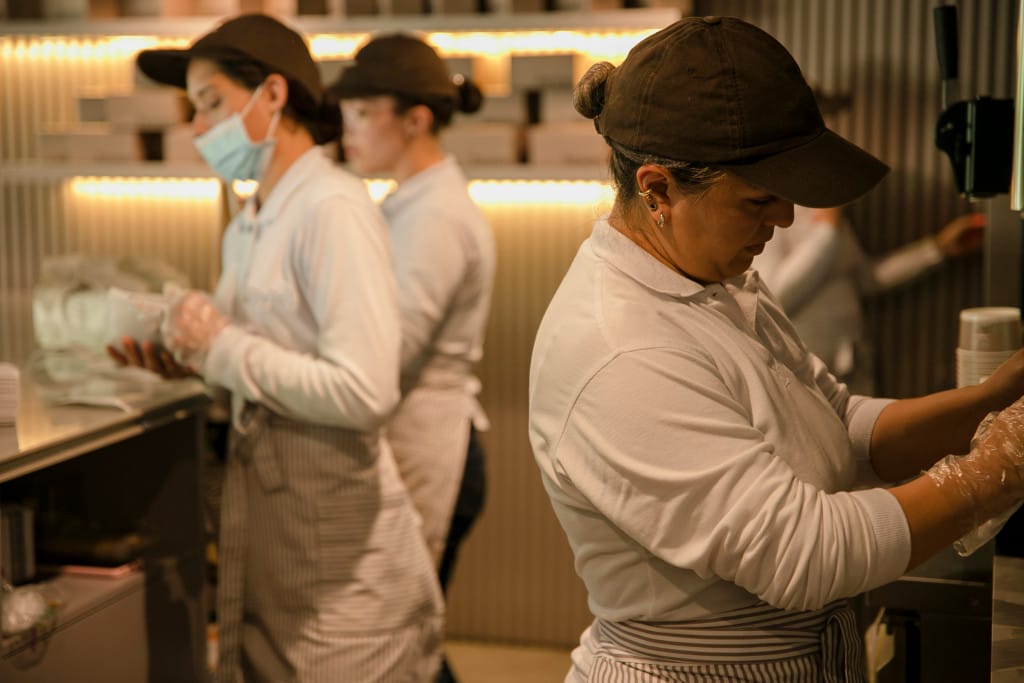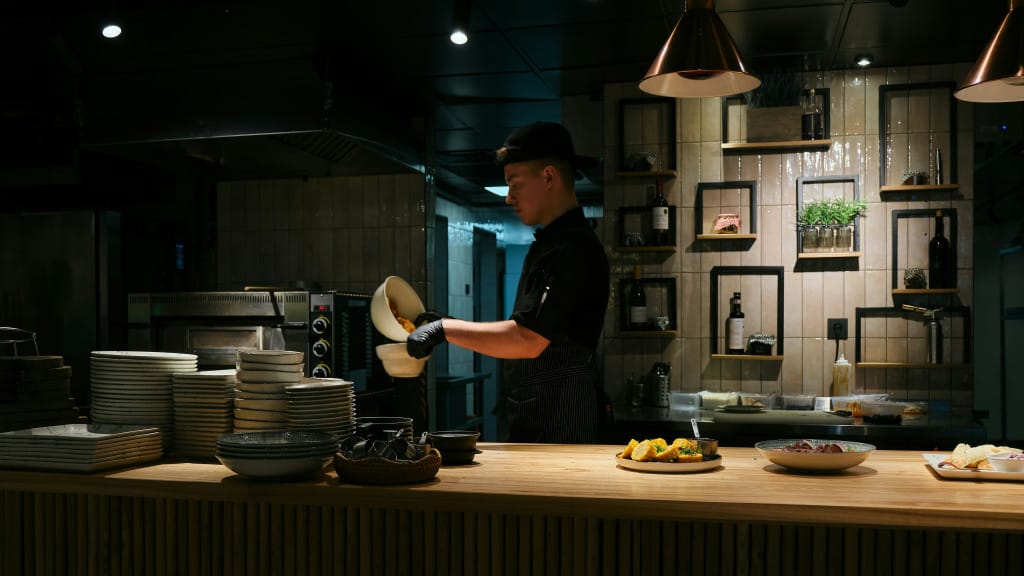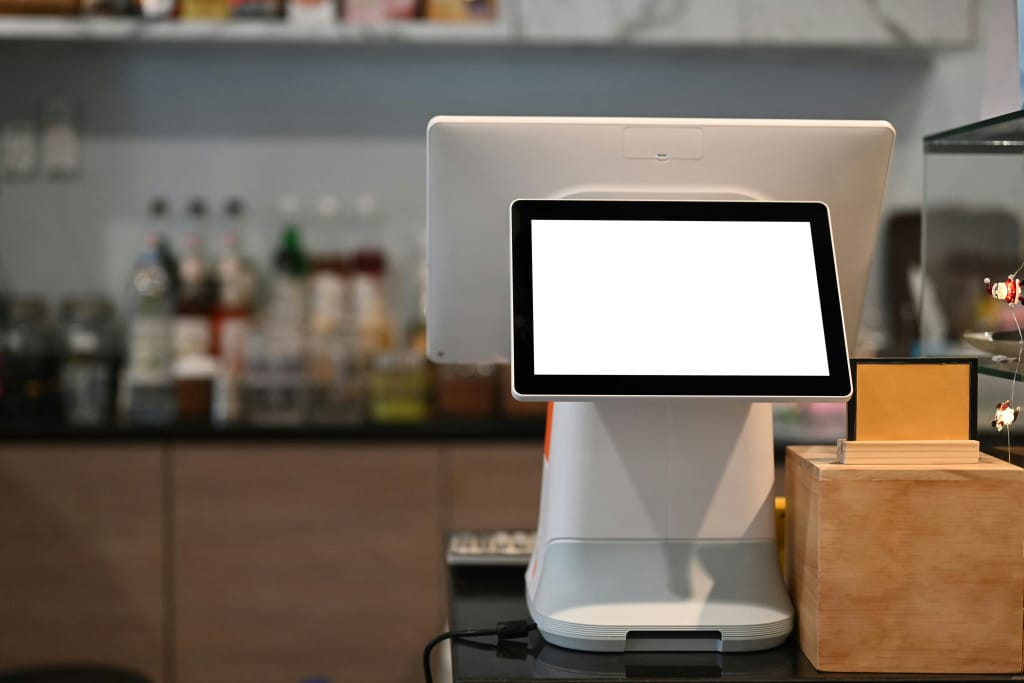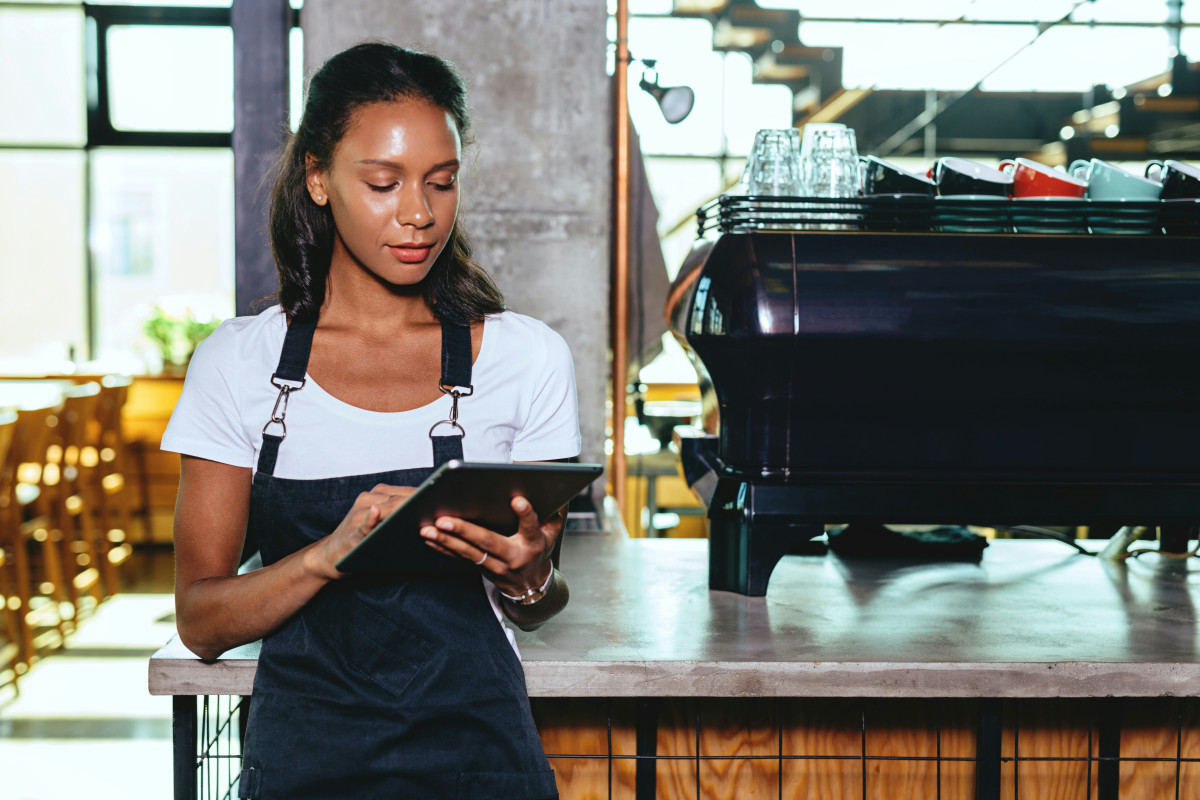Hospitality has always been about the people. But with new challenges that the industry is constantly facing (rising costs, ongoing labour shortages, and ever-higher guest expectations), it’s no doubt that it’s harder for venues to consistently deliver great experiences.
That’s why AI in hospitality is getting so much attention right now. It’s not some far-off future, it’s the now. If you’ve noticed how the industry has shifted in recent years, you’ll see AI quietly stepping in to handle those repetitive, stressful tasks that usually slow service down. Think about things like:
- Voice AI for restaurants that answers calls and takes reservations so staff can stay focused on guests.
- Automated booking confirmations that take the admin load off front-of-house teams.
- Smart inventory systems that predict stock needs and help cut down waste.
And it’s not just big chains. Venues across the industry are already seeing the benefits. Each year, more operators report smoother workflows, fewer headaches, and happier guests. The future of hospitality isn’t something in the distance, it’s already happening right now.
Where does AI fit in the future of hospitality?
Advantages of AI in hospitality
At the end of the day, AI will never replace the heart of hospitality. It can’t replicate the way a great server anticipates a guest’s needs, or how a manager diffuses tension with a smile. What AI can do is work quietly in the background, like an extra team member who takes care of the admin so your staff can focus on people.
The numbers back it up
Hospitality automation isn’t just a trend, it’s becoming the standard:
- Around 73% of hospitality companies are investing in AI to enhance customer experience, and AI chatbots now answer 87% of hotel inquiries.
- AI-driven personalisation has boosted guest satisfaction scores by up to 76%, while also reducing check-in times by up to 40%.
- Hotels leveraging AI-driven predictive analytics for demand forecasting have reported a 15–20% reduction in operational costs and a 10% lift in staff productivity.
Real-world examples of AI in the industry today
These aren’t abstract numbers, venues are already putting them into practice:
- Kura Sushi in the US (and many more venues) uses robot servers to deliver dishes, conveyor belts to bring food to tables, and automated systems to tally bills, blending novelty with efficiency.
- Yum Brands (Taco Bell, Pizza Hut, KFC) is rolling out AI-powered voice ordering across 500 locations, improving speed at drive-thrus while keeping staff focused on hospitality.
- IHG Hotels are experimenting with AI to design smarter menus, reduce waste with smart-bin cameras, and even choose new locations through AI-powered analytics.
- At Marriott Renaissance, AI kiosks now allow guests to skip the line with QR check-in, while staff spend more time on personal touches instead of paperwork.
- Reunion Resort has reduced front-desk strain with a web-based guest messaging system, automating upselling and reducing front-desk calls.
- Sydney’s own House of Pocket Group, Good Times Only, and an iconic Perth pub use Now Book It’s AI receptionist Sadie to take calls 24/7 and handle phone bookings.
Want to see how other venues are already embracing automation? Check out these ways restaurants are using AI to automate service.
The same tech is becoming accessible to operators everywhere and the benefits speak for themselves:
- Efficiency & automation: Smart systems take care of repetitive tasks—reservations, rostering, stock checks—so teams can focus on service. Kitchens run smoother with AI predicting prep times, while front-of-house avoids bottlenecks.
- Improved guest experience: AI-powered guest experience tools bring personalisation to venues of all sizes. From tailored menu suggestions to targeted loyalty offers, guests feel remembered and more likely to return.
- Consistency & accuracy: Automation reduces errors in orders, billing, and inventory, building trust through reliable, repeatable service.
- Data-driven decisions: AI trends in hospitality are giving operators sharper insights into pricing, staffing, and menu performance. Real-time data means smarter choices and more profitable outcomes.
- Cost savings & labour relief: With staff shortages still a challenge, AI answering calls for restaurants or handling FAQs takes pressure off the team. It doesn’t replace people, it supports them, giving staff more time to add warmth where it counts.

Key AI trends that are shaping the future of hospitality
The advantages of AI in hospitality are pretty clear by now—fewer repetitive tasks for your team, smoother service, and a guest experience that feels more personalised every time.
That brings us to the next step: understanding the key AI trends shaping the future of hospitality. Here are 10 that every restaurant and hotel operator should be watching.
1. Voice AI for restaurants
Missed calls often mean missed bookings, and in hospitality, that’s revenue walking out the door. Voice AI for restaurants changes that by picking up instantly, even during the dinner rush.
For operators, the benefits are twofold: fewer missed opportunities and more time for staff to focus on delivering great service. Sadie, Now Book It’s AI receptionist make this even easier by capturing every call, confirming bookings on the spot, and taking repetitive admin work off the team’s plate. The result? Happier guests, less pressure on staff, and stronger revenue (without losing the personal touch).
2. Restaurant workflow automation
Behind the scenes, restaurant workflow automation is smoothing out some of the trickiest parts of operations. Think:
- Inventory management with AI predicting what stock will run low.
- Staff scheduling that balances availability, labour costs, and forecasted demand.
- Kitchen operations that streamline prep times and ticket flow.
Instead of managers spending hours juggling spreadsheets, smart systems do the heavy lifting, freeing leadership to spend more time on training, culture, and guest experience.
3. AI-powered guest experience
Hospitality has always been about making people feel seen, and now technology is helping scale that personal touch. AI-powered guest experience tools allow restaurants and hotels to:
- Personalise marketing campaigns based on guest history.
- Suggest dishes or drinks tailored to past preferences.
- Enhance loyalty programs by rewarding repeat visits more strategically.
This isn’t just for luxury venues. Even small restaurants can now give regulars the VIP treatment, making guests feel remembered and valued.
4. Smart systems for hospitality
The smartest operators are connecting their systems, not juggling them. Smart systems for hospitality bring together POS integrations, AI-driven analytics, and even IoT-enabled tools like smart fridges or predictive maintenance sensors.
This gives operators a real-time view of their business, making decisions faster and reducing costly surprises. Which also means faster decisions, fewer surprises, and more consistent service.
5. Sustainability through AI
Guests are increasingly choosing venues that align with their values and sustainability is at the top of the list. AI is already helping reduce food waste and cut costs through:
- Predictive ordering that matches stock levels with demand.
- Smarter supply chains that cut down on over-purchasing.
- Waste-tracking tools that highlight where improvements can be made.
For operators, it’s about more than just cost savings. Reducing waste is both good for the planet and good for margins, a win-win that future-proofs your business.
If sustainability is on your radar, you might also want to check out our guide on healthy restaurant trends to explore how guest values are shaping hospitality decisions.

6. Dynamic pricing & revenue management
Hotels have used dynamic pricing for years, but now AI in restaurant management is levelling the playing field. Pricing tools can adjust menu items in real time based on demand, seasonality, or events.
Picture a rooftop bar in Sydney nudging cocktail prices up during summer weekends, or a London café offering weekday lunch specials to fill seats. This approach balances demand, boosts revenue, and keeps guests engaged with fair, transparent offers.
7. Predictive staff scheduling
Few things are more frustrating for managers than being overstaffed on a quiet night (or short-staffed during a rush). With predictive staff scheduling, AI analyses historical sales, local events, and even weather forecasts to build smarter rosters.
For teams, this means fewer last-minute changes. For operators, it keeps labour costs in check while ensuring service doesn’t slip when the dining room fills up.
8. AI-powered training & onboarding
Staff turnover is a constant challenge in hospitality, and training new team members takes time. AI-powered training tools, like virtual assistants, interactive simulations, and step-by-step learning modules are speeding up onboarding.
Instead of overwhelming new hires with manuals, AI creates a more engaging, personalised learning experience. This not only gets staff up to speed faster, but also builds confidence before they hit the floor.
9. Robot-assisted cooking and delivery
Robots in hospitality is no longer science fiction, it’s already part of hospitality. From robots that flip burgers to automated runners delivering dishes from kitchen to table, robot-assisted cooking and delivery is helping reduce wait times and free up staff for higher-touch service.
Hotels are experimenting too. Some already use robots to deliver room service, enhancing convenience for guests while reducing pressure on housekeeping.
10. Crowd management
Busy venues know the stress of managing peak times. AI-powered crowd management tools monitor venue capacity, track queue lengths, and optimise guest flow.
Think of a stadium bar in Toronto that uses sensors to reduce bottlenecks at service points, or a London hotel that tracks lobby traffic to redeploy staff before queues build. By smoothing out the flow, AI helps maintain a calm, guest-friendly atmosphere even when demand spikes.
Future-proofing your business: practical steps for restaurant owners
If you’re a restaurant owner or hospitality manager, here are some practical ways to bring hospitality automation into your business without losing the human touch.
Start small with simple wins
You don’t need to overhaul your entire operation overnight. Small steps can make a big difference.
- AI answering calls for restaurants: Voice AI can take bookings or handle common questions, freeing staff to focus on in-person service.
- Reservation automation: Guests get instant confirmations without your host being glued to the phone.
- Marketing campaigns: AI-powered guest experience tools can personalise emails, offers, and loyalty program nudges based on dining history.
These quick wins create immediate value and show your team that automation is here to support, not replace them.
Integrate with what you already use
The smartest systems for hospitality are the ones that plug seamlessly into your existing tools. AI that integrates with your POS, booking platforms, and CRM makes the experience smoother for both staff and guests.
For example, an automated system that syncs with your POS can adjust availability in real time, cutting down on double bookings or overselling. With Now Book It integrations, you can link your operations, marketing, events, payments, and more into one seamless workflow, so your tech works together instead of in silos.

Train your team to work with AI
New tech can sometimes feel daunting for teams, especially when AI enters the picture. The best approach is transparency. Show your team how restaurant workflow automation helps them:
- Fewer repetitive admin tasks.
- Smarter scheduling that avoids burnout.
- Tools that anticipate busy periods so they can focus on guest care.
Now Book It helps make this transition easier with hands-on onboarding, dedicated account management, and 24/7 local support, so staff have the confidence and training they need to get the most out of the system.
Keep the human touch
Hospitality will always be about people. Smart systems may handle routine tasks, but guests come back for the warmth, attentiveness, and personal care only humans can deliver.
Think of AI as handling the “backstage work”—managing bookings, predicting stock needs, or queuing up marketing campaigns—while your team stays front and centre, delivering the service that builds loyalty.
Stay adaptable
AI in restaurant management is evolving quickly. What feels cutting-edge today could be standard practice in a year. Keep an eye on AI trends in hospitality, test new tools, and choose solutions that match your venue’s size, style, and goals.
A small café might benefit most from automated reservations, while a hotel or multi-venue group might see bigger wins from predictive scheduling or AI-driven analytics.
Why the future of hospitality is human + AI
We’ve said it many times and we’ll say it again: AI can never replace hospitality. The heart of this industry has always been the people, the warmth, empathy, and personal connections that make guests feel at home.
What AI can do is make those moments easier to deliver. By handling calls, smoothing out scheduling, and cutting down on repetitive admin, AI frees up staff to focus on the part of the job no robotics or machine can deliver.
If you ask us, the future of hospitality isn’t about choosing between people or technology. It’s about combining both to build stronger teams, smoother operations, and experiences guests want to come back for.


